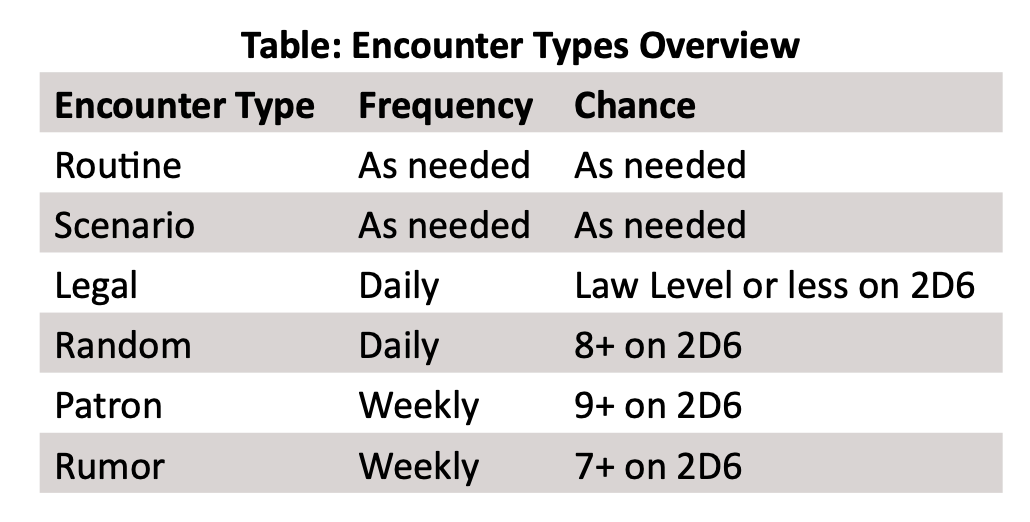Cepheus Review Ch14: Social Encounters
TOC
Social Encounters
As opposed to wilderness encounters, and not just plain “encounters” as in CT.

In the Cepheus Engine, an encounter is defined as an unexpected or casual meeting with someone or something. A large part of the Referee’s job is the administration of encounters. Through encounters, the Referee presents information, opportunities and conflicts for the players to interact with, which is the core of any gaming session.
There are a number of different types of social encounters: routine, legal, patron, random, rumor and scenario. The Encounter Types Overview table offers suggestions on the frequency of various encounters, and the chance associated with the occurrence of such an encounter.
Basically, the part where you meet people. You may get a job or patron, you may simply have to deal with bureaucratic hassle, things may go completely off the rails.
You may end up in the chapter on personal combat.
Routine encounters are just that. You’re at a restaurant, you are likely to talk to a waiter. Most likely nothing of import happens. Effectively set dressing, or something important disguised as such.
If the waiter happens to be an informant for the local mob keeping an eye on the players, then we’re entering the terrain of a scenario encounter. I don’t really like the terminology here because I oppose the Referee trying to push people into a “story”:
These related encounters are called scenario encounters, because they serve to further the plot of the adventure toward its climax. The Referee creates scenario encounters as dictated by the story they will tell.
… they are necessarily encounters expected because of actions taken by the players and events going on around them. These are encounters that happen because of what is going on in the rest of the world, and it responding to the players actions. The fixer they are meeting, the hit team sent after them, the doc patching up their comrade.
Random encounters are just that. Things players run into that aren’t part of any plan, that depending on circumstances bring new opportunities or hurdles or just be something odd that happens.
Legal encounters are a run-in with the cops who will at minimum ask the players to identify themselves. What happens next will be highly dependent on reaction rolls, if there is a BOLO for the players, if the players are carrying anything locally illegal, and so on. The odds of having one are based on the local law level.
Patron encounters are randomly generated but aren’t quite random encounters. Even if players aren’t actively searching for one, someone looking for people to fix a problem that may requires space transport, weapons, legally gray actions, or all of the above will seek out the kind of places where transients and spacers hang out to find likely prospects or patsies. Remember - the patron isn’t necessarily in possession of the truth, much less telling it.
The format recommended is similar to the CT rules in the Traveller Book, but only one is provided:
• The patron’s name and role. Names can be changed if the patron encounter is reused.
• The skills and resources required to complete the mission
• The suggested reward for the mission
• The mission as described to the characters
• What’s really going on. Several possible variants are presented – either pick or roll for which is the real situation. This is the key element that allows reusability.
Rumors don’t involve a specific person, but can be thought of as randomized worldbuilding. Maybe there’s a hook for the players to go haring off after. Maybe it’s just news of a change in tensions between polities, or a hint of a gang war. There’s no specific patron or person, it’s jsut a relayed story. it may be true, it may be utterly false.
Attitudes - or what Cepheus uses as “reaction.” Per the rules, the referee decides what the initial baseline reaction is which then can be modified through skills and actions. For many encounters this may be sensible - a set of guards at a villa the players are raiding aren’t likely to invite them for a beer. On the other hand, if the players are pretending to be members of a cleaning service, the baseline watchfulness may be severely affected by the affability of the player’s characters. It’s easier to sell that you’re just a bunch of janitors if the guards think you’re cool instead of pissed at something about how you carry yourselves.
Bluntly, I’d really like a set of reaction rolls for where the attitude is not immediately obvious. Even in those cases - how many times in literature do we have bad guys who like the protagonist in some way, even saving or showing mercy to them in moments balanced on a knife edge, and no, this is nothing new. Think Treasure Island and Long John Silver. If I run a Cepheus campaign I’m definitely adding one.
That said, the five basic attitudes are hostile, unfriendly, indifferent, friendly, and helpful. From there, a difficult (at -2) social standing check with the appropriate skill such as liason can be used to try and modify the attitude. Note that depending on the degree of success or failure, you can make the NPC’s attitude better or worse.
Wrapping It Up
Pretty much the original CT rules, or close enough that it’s not difficult to get used to. I think the big thing missing is some form of randomized reaction rolls.
Meet Our Friends
The Last Redoubt is a reader-supported publication. To receive new posts and support my work, consider becoming a free or paid subscriber.
Please also join the Pilum Press Discord and/or the Autarch Discord. Pilum is the publisher of several books and short story collections including Shagduk and Thune’s Vision. Autarch is the home of the Adventurer Conquerer King RPG.




